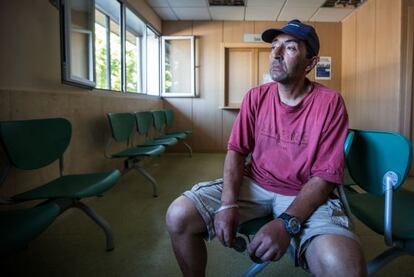The program curing drug addicts with heroin
Controversial treatment celebrates 10th anniversary and seeks to expand Cost justified by positive impact on society, doctors say

Ten years ago, Pedro and Miguel Ángel's days were spent between an industrial park where they bought drugs and a medical center where they got methadone. Estranged from their families and each weighing just 90 pounds, they spent their time trying to get money for their next fix. That all changed one day, when two men approached them and urged them to join a controversial new program.
Ten years on, Pedro and Miguel Ángel are proud success stories of Pepsa (The Experimental Project of Narcotic Prescription). This program, based in Granada, treats heroin addicts by giving them heroin instead of methadone.
The idea is to give addicts the drug in such a way that they will gradually need less and less to feel normal - and the signs are that it works.
In the first year, the project was a clinical study, but after positive results it became a permanent program. It is now celebrating its 10th anniversary, treating 23 people at its home in the outpatients building of the Virgen de las Nieves hospital.
It seems as if we give free drugs at the hospital and it isn't like this"
The entrance to the unit is decorated with paintings produced by their patients. One of them was painted on the sixth anniversary of the unit, and says "I was born again six years ago."
Miguel Ángel, 50, is now accepted by his family although, he says: "They still don't trust me, and I understand." He shows his wallet, which contains five euros. "If I had had this before, I would have gone straight to the industrial park," he says.
Pedro began taking heroin in the 1990s when a workmate offered him some. He now lives on a pension and receives discapacity benefit because he is an HIV carrier. He can now organize his bills and spends his money on food, not drugs.
Despite its success, the plan has not been extended to other parts of Spain, although it is now operating in other countries such as Germany, the Netherlands and Switzerland.
"It is a controversial program," admits the director, José Antonio Reyes. "It seems as if we give free drugs at the hospital and it isn't like this. I think that there has been little interest in extending it."
The medicinal use of heroin is permitted by the Spanish Medical Agency, but there are strict prerequisites.
The cost of preparing the doses of heroin is 40,000 euros a year
The Agency only approves the treatment for adult patients who are at risk of social exclusion, who are separated from their family and who have tried conventional treatments twice before unsuccessfully. The project aims to give addicts back their dignity and improve their quality of life.
Gustavo, aged 36, who started smoking heroin when he was 12 or 13, has definitely seen an improvement in the year since he joined. Like the other patients he comes to the center twice a day, once in the morning and once in the afternoon, to get his doses. Each time his blood pressure and sugar levels are checked. Then he goes to the window, gets his vial of heroin and injects it in another room.
It is not only skepticism that prevents the program's expansion. It is also the problem of finding funding to set up and manage centers like Granada's.
Society ends up spending less on addicts' accidents and overdoses
The cost of preparing the heroin - a process which is carried out on site and under tight security - is 40,000 euros a year. The store where the opiate is kept is guarded by security cameras, all the doors to the center need magnetic cards to be opened and all the individual doses are numbered and registered.
Having been endorsed by international publications, the project leaders argue that funding for such centers is an investment as society will end up spending less money on treating drug addicts following accidents and overdoses. As addicts commit fewer crimes in attempting to get their "fix," the legal authorities will also save time and money. These results were published last year in the journal of the Canadian Medical Association, where similar programs exist.
"Also, 100 percent of patients with serious illnesses (HIV, hepatitis, etc) are treated and all of them have stopped injecting in the street," explain the staff at Pepsa.
The next objective of the plan's promoters is to have patients take the heroin orally, instead of injecting it. This would not only make it more comfortable for the patient, but would also aid the expansion of the project to other centers, as they would not require such specific equipment. This is attracting interest from other regions.
"We are not saying that this treatment is the best solution," concludes Rosario, a doctor at Pepsa, "We are saying that it is another alternative that works, and you have to realize that."
Tu suscripción se está usando en otro dispositivo
¿Quieres añadir otro usuario a tu suscripción?
Si continúas leyendo en este dispositivo, no se podrá leer en el otro.
FlechaTu suscripción se está usando en otro dispositivo y solo puedes acceder a EL PAÍS desde un dispositivo a la vez.
Si quieres compartir tu cuenta, cambia tu suscripción a la modalidad Premium, así podrás añadir otro usuario. Cada uno accederá con su propia cuenta de email, lo que os permitirá personalizar vuestra experiencia en EL PAÍS.
¿Tienes una suscripción de empresa? Accede aquí para contratar más cuentas.
En el caso de no saber quién está usando tu cuenta, te recomendamos cambiar tu contraseña aquí.
Si decides continuar compartiendo tu cuenta, este mensaje se mostrará en tu dispositivo y en el de la otra persona que está usando tu cuenta de forma indefinida, afectando a tu experiencia de lectura. Puedes consultar aquí los términos y condiciones de la suscripción digital.









































